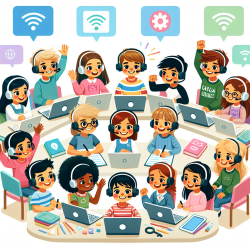In today's rapidly evolving educational landscape, the role of school counselors has never been more critical. As we face unprecedented challenges in student mental health, it is essential to explore innovative solutions that can effectively support our students. One such solution is online therapy, a research-driven approach that is transforming the way we think about mental health services in schools.
Recent studies have shown that online therapy can be as effective as traditional face-to-face counseling. This is particularly significant in a school setting, where access to mental health resources can be limited. Online therapy provides a flexible and scalable option that can reach a larger number of students, regardless of their location.
The Research Behind Online Therapy
Several research studies have highlighted the benefits of online therapy for students. Here are some key findings:
- Accessibility: Online therapy removes geographical barriers, making it possible for students in remote or underserved areas to receive the support they need.
- Convenience: Sessions can be scheduled at times that are convenient for students, reducing the need for them to miss class or extracurricular activities.
- Comfort: Many students feel more comfortable opening up in a virtual environment, which can lead to more effective therapy sessions.
- Consistency: Online therapy platforms often provide tools for continuous monitoring and follow-up, ensuring that students receive consistent care.
Implementing Online Therapy in Schools
For school counselors, integrating online therapy into existing support systems can be a game-changer. Here are some steps to consider:
- Assess Needs: Conduct a needs assessment to determine the specific mental health challenges faced by your student population.
- Select a Provider: Choose a reputable online therapy provider that specializes in working with schools. Look for providers with a strong track record and evidence-based practices.
- Training: Ensure that school staff, including counselors and teachers, are trained on how to support students in accessing and utilizing online therapy services.
- Promote Awareness: Raise awareness among students and parents about the availability and benefits of online therapy. Provide information on how to access these services.
- Monitor and Evaluate: Continuously monitor the effectiveness of online therapy services and make adjustments as needed. Collect feedback from students, parents, and staff to inform improvements.
Success Stories
Many schools have already seen positive outcomes from implementing online therapy. For example, one school district reported a significant reduction in student anxiety and depression levels after integrating online therapy into their mental health support system. Students who previously struggled to access mental health services were able to receive timely and effective support, leading to improved academic performance and overall well-being.
Looking Ahead
As we look to the future, it is clear that online therapy will play a crucial role in supporting student mental health. By leveraging technology and research-driven practices, school counselors can provide more accessible, effective, and consistent care to their students. At TinyEYE, we are committed to helping schools navigate this transition and unlock the full potential of online therapy.
We invite school counselors to explore the possibilities of online therapy and consider how it can enhance their mental health support systems. Together, we can create a brighter future for our students, one where mental health is prioritized and every student has the opportunity to thrive.










